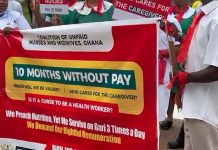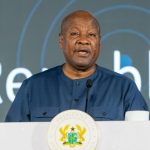The World Bank has downgraded Ghana’s 2025 gross domestic product (GDP) growth projection to 3.9%, falling below the government’s target of 4.4%.
This updated forecast, detailed in the April 2025 edition of the Bretton Woods institution’s Africa’s Pulse report, represents a slight decline from the previous estimate of 4.3%. The Bank attributes the revision to persistent inflationary pressures and ongoing external vulnerabilities.
Despite the downgrade, the World Bank remains cautiously optimistic about Ghana’s medium-term outlook, projecting a rebound in GDP growth to 4.6% in 2026 and 4.8% in 2027.

The report also draws attention to climate-related risks, particularly erratic weather patterns affecting cocoa production in Ghana and Côte d’Ivoire—two of the world’s largest cocoa producers. It warns that climate-induced events such as floods and droughts are shrinking national budgets across Africa by as much as 9%, resulting in economic setbacks ranging from 2% to 5%.
On a more encouraging note, Ghana is among the few African economies showing early signs of recovery in 2025. High-frequency indicators, including the Purchasing Managers Index (PMI), point to a pickup in business activity. The country’s PMI rose from 47.9 in January to 50.6 in March, indicating rising demand, easing supply chain bottlenecks, and a revival in investor confidence following the December 2024 presidential elections.
“Business activity in Mozambique and Ghana rebounded in February 2025,” the World Bank observed.
“The modest uptick in Ghana was driven by increased demand and a resurgence in new business engagements.”
Across the region, Sub-Saharan Africa’s economic growth is expected to rise slightly from 3.3% in 2024 to 3.5% in 2025, with further acceleration to 4.3% by 2026–2027.
However, the continent’s overall trajectory remains constrained by weak performances in its three largest economies—Nigeria, South Africa, and Angola. Excluding these, the rest of Sub-Saharan Africa is projected to grow by 4.6% in 2025, rising to 5.7% by 2027.
Still, the World Bank warned that elevated downside risks—including global policy uncertainties, climate shocks, and fiscal constraints—pose ongoing threats to a sustained and inclusive recovery across the continent.






















































![[FREE FREE MONEY] Predict and Win a Guaranteed GH¢200 From Us EVERY WEEK](https://wordpress.ghanatalksradio.com/wp-content/uploads/2022/02/Predict-and-Win-Final-09-03-2021-218x150.jpg)
![[Predict & Win – 8th/Oct.] WIN A Guaranteed ¢200 From Us This Week](https://wordpress.ghanatalksradio.com/wp-content/uploads/2021/10/maxresdefault-16-218x150.jpg)
![[Predict & Win – 2nd] WIN A Guaranteed ¢200 From Us This Week](https://wordpress.ghanatalksradio.com/wp-content/uploads/2021/09/maxresdefault-50-218x150.jpg)
![[Predict & Win – 25th] WIN A Guaranteed ¢200 From Us This Week](https://wordpress.ghanatalksradio.com/wp-content/uploads/2021/09/maxresdefault-36-218x150.jpg)
![[Predict & Win – 18th] WIN A Guaranteed ¢200 From Us This Week](https://wordpress.ghanatalksradio.com/wp-content/uploads/2021/09/maxresdefault-23-218x150.jpg)








![[National cathedral] See full list of churches that have contributed since 2018](https://wordpress.ghanatalksradio.com/wp-content/uploads/2020/09/Ghana-National-Cathedral-GhanaTalksRadio-100x70.jpg)

![[Property tax dispute] Ghana Revenue Authority addresses concerns of Asokwa Assembly Members](https://wordpress.ghanatalksradio.com/wp-content/uploads/2023/02/GRA-1-100x70.png)
![[Galamsey fight] Gov’t gives deadline for registration of all excavators](https://wordpress.ghanatalksradio.com/wp-content/uploads/2022/10/Galamsey-fight-Gov’t-gives-deadline-for-registration-of-all-excavators-100x70.jpeg)
